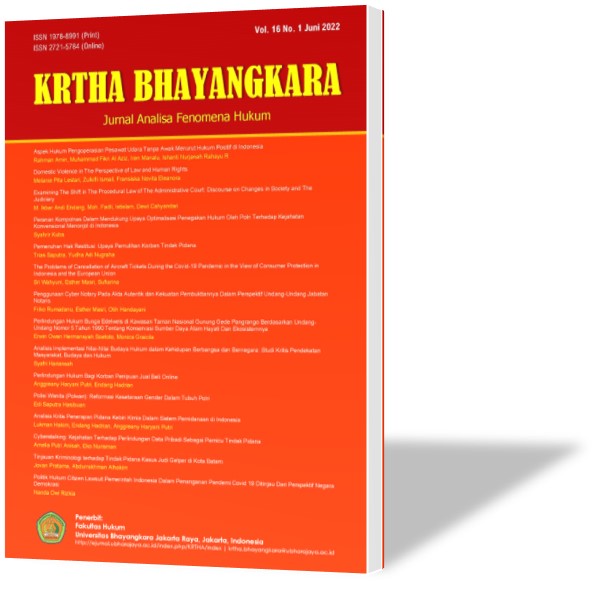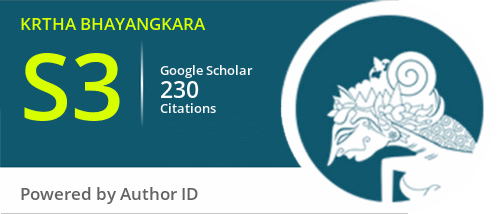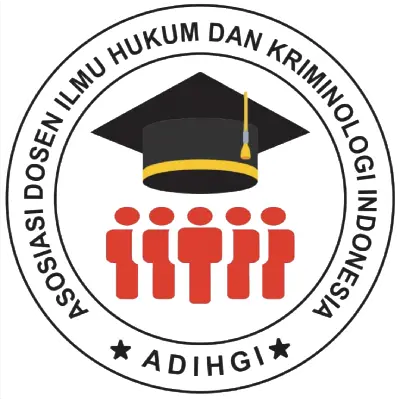Dualitas Kepemimpinan: Eksistensi Masyarakat Adat (Pakraman) Desa Kutuh Bali Menuju Desa Anti Korupsi dan Terkaya se-Indonesia
DOI:
https://doi.org/10.31599/krtha.v16i2.1222Keywords:
Duality of leadership, Mitigation of corruption in village funds, Traditional village awig-awigAbstract
Usually in a village there is only one leader. However, this does not apply in Bali, namely the Kutuh Traditional Village. Kutuh Village is led by 2 people with different functions and jobs. Between the two by calling, its leadership duality, not dualism. Leadership that is mutually beneficial and supports each other, strives together to build Kutuh village towards an advanced village. This empirical research has been ongoing since 2021 and has interviewed village officials, the indigenous people of Kutuh-Bali Village aim to find out how the synergy between the Head of the Service Village and the Head of the Traditional Village of Kutuh Village in making their village advanced by optimizing the Village Fund and even getting the title as an anti-corruption village. corruption and the richest village in Indonesia. This study draws the conclusion that the duality of leadership is harmoniously intertwined between the village head of the "perbekel" service and the traditional village head "Bendese Adat" who is worried about the trihita karana philosophy which is Balinese local wisdom. Synergy is seen at the intersection in the management of village funds. The Village Service in carrying out activities relies on customary law called written awig-awig. These intersections have an impact on the decision-making process, implementation and direct supervision by indigenous peoples in the management of village funds. So that the existence of indigenous peoples is still strongly maintained and duality continues and is proven to work in harmony according to their respective duties because their manners are the same. Thus, the existence of indigenous peoples or pakreman together with the official village both play an important role in the current framework of constitutional life, in order to realize the welfare of the community.
References
Amalia Syauket, Bambang Karsono 427
DAFTAR PUSTAKA
Buku
Dharmayuda, I Made Suasthawa. Desa Adat Kesatuan Masyarakat Hukum Adat Di Propinsi Bali. Denpasar: Upadasa Sastra, 2001.
Paramartha, I Gede. Silang Pandang Desa Adat Dan Desa Dinas Di Bali. Denpasar: Udayana University Press, 2012.
Sugiyono. Metode Penelitian Kuantitatif, Kualitatif, Dan R&D. Bandung: Alfabeta, 2016.
Windia, Wayan p. Hukum Adat Bali Dalam Tanya Jawab. Udayana University Press, 2013.
Jurnal
Ernawati, Dyah Poespita. “Analisis Sinergi Desa Pakraman Dan Desa Dinas Dalam Peningkatan Partisipasi Masyarakat Pada Pembangunan Desa Di Provinsi Bali.” Jurnal Ilmiah MEA (Manajemen, Ekonomi, dan Akuntansi) 3, no. 1 (2019).
Mulyanto. “Keberlakuan UU No 6 Tahun 2014 Tentang Desa Di Bali Dalam Perspektif Sosiologi Hukum.” Mimbar Hukum 27, no. 3 (2015): 418–431.
———. “Penguaran Masyarakat Hukum Adat Dalam Undang-Undang Nomor 6 Tahun 2014 Tentang Desa Dari Perspektif Kajian Yuridis.” Journal of Indonesian Adat Law 2, no. 3 (2018): 74–104.
Putri, Kadek Ayu Monica Pastika, Ni Wayan Fenni Puspitasari, Ni Ketut Krisna Dewi, Ni Wayan Ekarini, Ida Ayu Putu Priska Dewi, and Dewa Putu Kodi Mertadana. “Pengaruh Hukum Adat Atau Awig-Awig Terhadap Pengelolaan Dana Desa Di Desa Banjar Kecamatan Banjar Kabupaten Buleleng Provinsi Bali.” Jurnal Ilmiah Akuntansi dan Humanika 8, no. 1 (2018). https://ejournal.undiksha.ac.id/index.php/JJA/article/view/19856.
Satrya, I Ketut Teguh Yudha, Ni Kadek Sinarwati, and Nyoman Trisna Herawati. “Sinergi Desa Adat Dan Desa Dinas Dalam Pengelolaan Aset Desa Untuk Mewujudkan Harmonisasi (Studi Pada Desa Adat Dan Desa Dinas Sambangan).” Jurnal Ilmiah Mahasiswa Akuntansi 7, no. 1 (2017). https://ejournal.undiksha.ac.id/index.php/S1ak/article/view/9376.
Wijaksono, Sigit. “Pengaruh Lama Tinggal Terhadap Tingkat Partisipasi Masyarakat Dalam Pengelolaan Lingkungan Permukiman.” COMTECH 4, no. 1 (2013). https://journal.binus.ac.id/index.php/comtech/article/view/2679.
Conference Prosiding
Noak, Piers Andreas. “Kedudukan Dan Kewenangan Desa Adat Dan Desa Dinas Di Bali Pasca Pemberlakuan UU Nomor 6 Tahun 2014 Tentang Desa Dalam Perspektif
KRTHA BHAYANGKARA | Volume 16 Number 2, December 2022
Dualitas Kepemimpinan: Eksistensi Masyarakat Adat (Pakraman) Desa Kutuh Bali …
Administratif.” In International Conference on Strengthening Political Party in Election, Parliament, and Government in Semarang Indonesia. Semarang: University Walisongo, 2016.
Setiabudhi, I Ketut Rai, I Gede Artha, and I Putu Rasmadi Arsha Putra. “Urgensi Pengawasan Mencegah Terjadinya Korupsi Dana Desa.” In International Conference On Science, Technology and Humannities. Bali: Universitas Udayana, 2018.
Peraturan Perundang-Undangan.
Bali, Peraturan Daerah Provinsi. Peraturan Daerah Provinsi Bali Nomor 3 Tahun 2001 Tentang Desa Pakraman, 2001.
RI, Peraturan Pemerintah. Peraturan Pemerintah Indonesia Nomor 1 Tahun 1957 Tentang Pokok-Pokok Pemerintahan Daerah, 1957.
———. Peraturan Pemerintah Indonesia Nomor 18 Tahun 1965 Tentang Pokok-Pokok Pemerintahan Daerah, 1965.
———. Peraturan Pemerintah Indonesia Nomor 19 Tahun 1965 Tentang Desapraja Sebagai Bentuk Peralihan Untuk Mempercepat Terwujudnya Daerah Tingakt III Di Seluruh Wilayah Republik Indonesia, 1965.
———. Peraturan Pemerintah Indonesia Nomor 22 Tahun 1948 Tentang Penetapan Aturan-Aturan Pokok Mengenai Pemerintahan Sendiri Di Daerah-Daerah Yang Berhak Mengatur Dan Mengurus Rumah Tangganya Sendiri, 1948.
———. Peraturan Pemerintah Indonesia Nomor 22 Tahun 1999 Tentang Pemerintahan Daerah, 1999.
———. Peraturan Pemerintah Indonesia Nomor 32 Tahun 2004 Tentang Pemerintahan Daerah, 2004.
———. Peraturan Pemerintah Indonesia Nomor 5 Tahun 1974 Tentang Pokok-Pokok Pemerintahan Di Daerah, 1974.
———. Peraturan Pemerintah Indonesia Nomor 6 Tahun 2014 Tentang Desa, 2014.
Berita
Bitra. “Kenali Modus-Modus Korupsi Dana Desa.” Bitra.or.Id, 2019. http://bitra.or.id/2012/kenali-modus-modus-korupsi-dana-desa/.




































